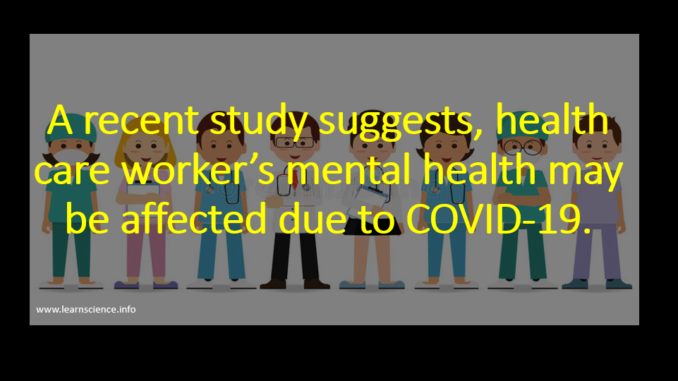
- The pandemic COVID-19 has both direct and indirect effect on health workers and non-medical workers working in hospitals.
- During SARS outbreak in 2003, health staffs were adversely affected by fear of infecting their families, friends and developed various psychological symptoms like insomnia, depression and anxiety. Similar is the scenario in the present COVID-19 pandemic.
- According to a study done 1257 health workers of 34 hospitals in different regions of China, most of the health workers reported developing symptoms of depression, anxiety, insomnia and distress. Such symptoms were more common in nurses and front-line health care workers who are directly involved in providing nursing care to patients with COVID-19.
- The increasing number of confirmed and suspected cases, lack of proper PPE (Personal Protective Equipment), increased workload, lack of specific drugs and feeling of being inadequately supported may be the reasons of developing mental health issues in frontline health workers. Moreover, the human-to-human transmission of COVID-19, its high morbidity and fatality may enhance perception of personal danger.
- They also found that compared to health workers outside Wuhan (epicenter of COVID-19 outbreak), those who were in Wuhan experienced more severe symptoms of depression, anxiety and distress.
- According to another study conducted in hospitals of Singapore, non-medical health workers had higher prevalence of anxiety. The level of trauma was less in frontline nurses compared to non-frontline nurses and non-medical health workers. This may be due to multiple reasons like less accessibility to psychological support, less intensive training on PPE and infection control measures and less first-hand medical information on outbreak.
- Another study of 20 nurses who provided care for COVID-19 patients in the First Affiliated Hospital of Henan University of Science and Technology from 20 January to 10 February 2020, both positive and negative emotions coexisted in such situations. Negative emotions were dominant in early stage which gradually decreases due to appearance of positive emotions. Positive emotion develops because of psychological support and self-coping style.
- These studies prove that all health workers including front-line, non-frontline and non-medical health workers are at higher risk of developing psychological symptoms due to this COVID-19 pandemic. So, the hospitals should pay proper attention to manage the stress of COVID-19. It can be done by effective communication, providing proper training and equipment, encouraging self-care, providing help resources and peer support.
- All the medical and non-medical health care workers should work as a team, stay connected, take breaks even for just a couple of minutes, stay updated, monitor oneself for signs of increased stress, speak up about safety and establish formal peer support to encourage each other.
References
- https://jamanetwork.com/journals/jamanetworkopen/fullarticle/2763229
- https://www.ncbi.nlm.nih.gov/pmc/articles/PMC154178/
- https://www.ncbi.nlm.nih.gov/pmc/articles/PMC7143149/
- https://www.ncbi.nlm.nih.gov/pmc/articles/PMC7141468/
- https://annals.org/aim/fullarticle/2765173/annals-hospitalists-inpatient-notes-preparing-battle-how-hospitalists-can-manage